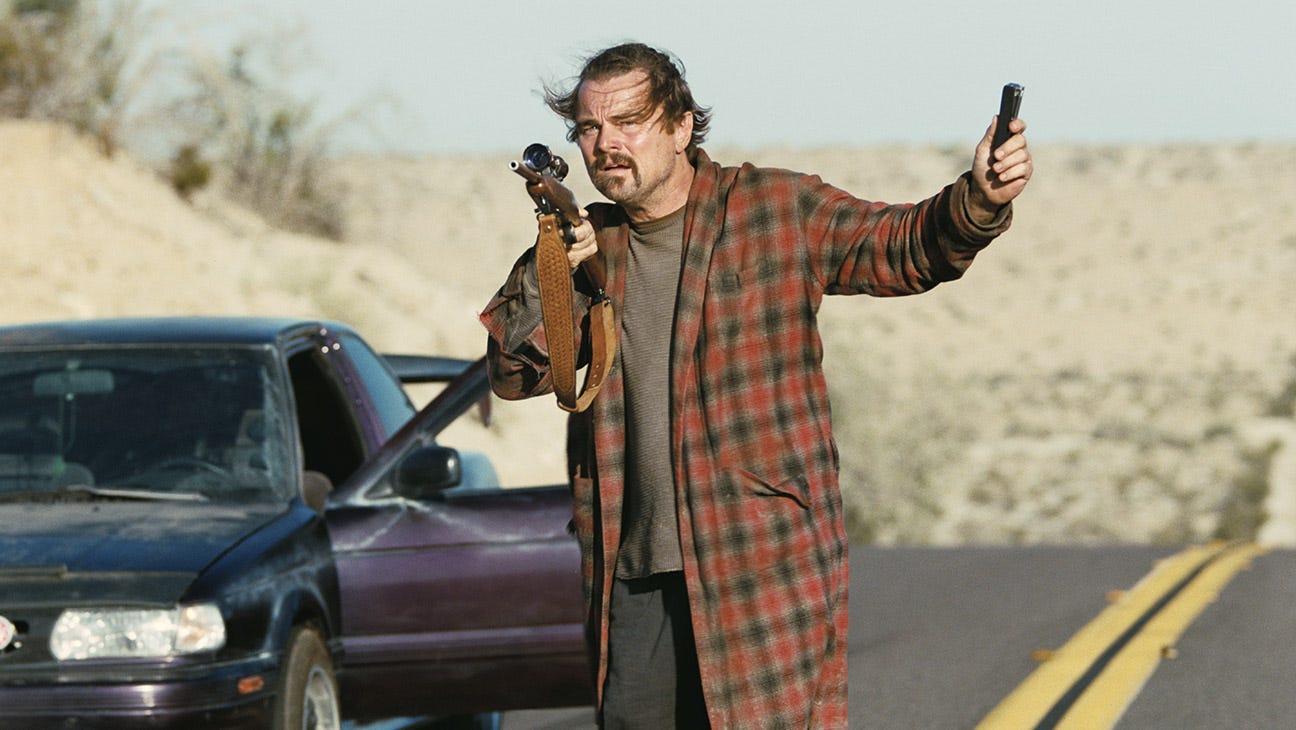A permanently altered state
'One Battle After Another' as a reflection of growing up Millennial
“Just because you’re paranoid, doesn’t mean they aren’t after you”
— Joseph Heller’s Catch-22.
Paul Thomas Anderson’s One Battle After Another practically compels you to see it more than once. I haven’t, and yet know I will need to in order to appreciate all of its facets. This is not because it is inscrutable, but rather because its characters provide so many different angles of explorations. Its clear what this film is about—what buries it in your psyche are the various vantage points from which you can take it all in.
It’s no wonder that I spent most of my first viewing thinking about the action from the perspective of Leonardo DiCaprio’s Bob Ferguson. He is, after all, the middle-aged white guy who isn’t a brownshirt. He has a daughter, too.
Unlike so many other characters played by DiCaprio over the years, Bob Ferguson is defined by a paranoid ennui. DiCaprio has looked this disheveled before—we do have The Revenant, after all—but it’s hard to think of a role where he’s seemed so insecure and lacked so much confidence in his ability to do just about anything well. It’s an interesting progression in DiCaprio’s on-screen persona (there’s probably a whole separate essay to be written on the subject), but it’s also quite a comment on where we are generally.
Here is Jack Dawson and Romeo, or even the imperious Jordan Belfort and Calvin Candie if you look at the other side of the coin, crippled to the point of near-inaction by depression and anxiety.
What drives it? What turned “Ghetto” Pat (aka “Rocketman”) in to Bob friggin’ Ferguson? Well, I’d argue it is the combination of disappointment in the kind of change a radical revolutionary movement can effect, watching the forward march of dark reactionary forces in response, and, most important of all, the deep vulnerability that comes with having a child to care for and protect.
I can’t claim “Ghetto” Pat’s radical bona fides—my life has not been remotely that bold or courageous or interesting—but there are many days when I share in his anxiety about just what the hell is going on and where all of it is headed. I spend a not-insignificant amount of my time feeling trapped between the notion that I should be doing more to bring about the world I want my kids to live in and worrying about what that might mean for my main job right now: keeping them safe and healthy.
For me, the anxiety is low-stakes and largely theoretical. For Bob Ferguson, it’s quite real. Steven J. Lockjaw is still out there, rising up the ranks and garnering commendations from the most powerful military force in human history.
I’ve had this running joke with family and friends that fatigue is, ironically, the thing that is most animating about my politics in this extended moment. The punchline is that I want to found a political movement or party simply called I’m Tired.
The irony, of course, is that I’ve been too tired to do anything about it yet, and I still am. Terrorist attacks, financial crises, the rise of authoritarians, a global pandemic, and getting up in the middle of every night to soothe infants, and toddlers, and kids do take their toll. I feel it myself, and I saw it all over Bob Ferguson’s face—I felt it every time he sparked something up to calm his nerves.
The “artificial intelligence” in Google’s search results (speaking of sources of anxiety) tells me that two of the reasons for a permanently altered state are “trauma” and “neuroplasticity and experience.”
As an elder Millennial, I have plenty of both, and so does Bob Ferguson. I have no earthly idea if that makes the two of us any different from previous generations upon their arrival at middle age. What I do know is that, hapless and exposed as I feel, I’m trying to choose a path like Bob’s—that is to say putting one foot in front of the other so that my children can have an opportunity to do the same.



